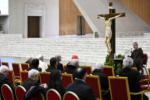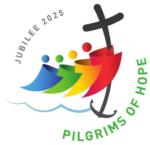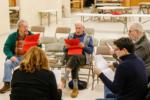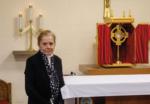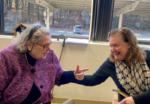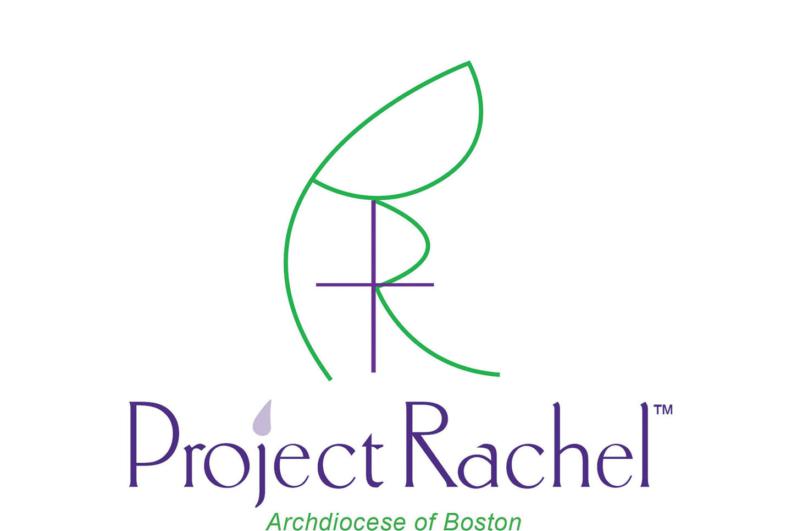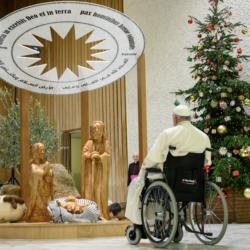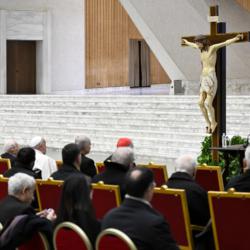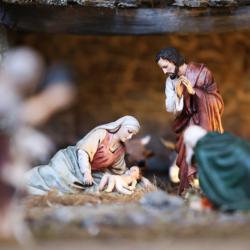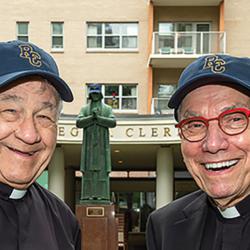Project Rachel helps bring healing to women after abortion
BRAINTREE -- Over 2,500 years ago, the prophet Jeremiah described Rachel, one of the matriarchs of Israel, "weeping for her children and refusing to be comforted, because they are no more" (Jeremiah 31:15). He then passed on the Lord's message to cease such mourning, offering hope for Rachel's descendants.
Speaking in December, Pro-Life Office Director Marianne Luthin said she believes the significance of the archdiocese's Project Rachel lies in the latter half of that passage. As a ministry for women who have had abortions, it offers grieving mothers healing and hope for the future.
"When you think about it, Rachel could have wept her entire life, and she never could have healed herself from the pain. It was only the action of God coming first, God speaking to Rachel," that enabled her to heal, Luthin said. She added, "and we know that hope for healing ultimately comes from God."
Project Rachel is meant to provide a safe, confidential place for post-abortive women to talk about their experiences, where they will be heard with respect and compassion.
The program began in 1985 through the work of Vicki Thorn, a trauma counselor and spiritual director from the Diocese of Milwaukee. She was inspired to begin the ministry after personally witnessing the "severe reactions" of women who had abortions.
She eventually allowed the name Project Rachel, referring to the Jeremiah passage, to be used by the U.S. Conference of Catholic Bishops. While such programs can be found across the country, each diocese implements it in a slightly different way, Luthin explained.
The Archdiocese of Boston's Project Rachel ministry began offering its one-day "Come to the Waters of Healing" retreats in 2005. They initially held the retreat twice a year but later increased it to six times a year. They also run a support group for women who have participated in the retreat, who now number over 500.
Luthin believes that what makes Project Rachel unique is that it seeks to be "an integrated approach to healing." This means aiming to heal the whole person -- body, mind, heart, and soul. To do this, Project Rachel brings together specially trained priests, licensed mental health professionals, and laywomen, some of whom have had abortions themselves. They also have a network of prayer supporters, who begin praying for each participant a week before the retreat takes place.
Luthin noted that many post-abortive women are not sure the Church would welcome them.
"To know that Project Rachel is a ministry of the Catholic Church, it's supported by the Church, and individuals are actually praying for them and their healing, it's a remarkable blessing, and very deeply appreciated," Luthin said.
Most retreat participants learn about Project Rachel through parish bulletins, which are more anonymous than flyers that a woman might be seen picking up. And the program's mention in the bulletin makes it clear it is connected to the Church. Women are also referred by friends who have gone through the program, therapists who recognize they need spiritual help or priests they speak to in confession.
Luthin explained that the highest rates of abortions were in the years immediately following the Roe v. Wade decision 50 years ago. As a result, most of the Project Rachel retreat participants tend to be older women.
She recalled how, before Roe v. Wade, women were told that a fetus was "just a blob of tissue."
"Fast forward 20 years later, they see an ultrasound of a child at the very time they (had) the abortion -- you can see how that would have hurt so deeply," she said.
Statistics indicate that over 63 million abortions were performed in the U.S. under Roe v. Wade. Luthin clarified that some women had multiple abortions, so the number of women is not as great as the number of abortions. However, every abortion also involves other people -- boyfriends, husbands, parents, or others who may have pressured the woman to have an abortion.
"This issue has literally affected tens of millions of people. There's a lot of pain out there that needs to be addressed," Luthin said.
While only post-abortive women are allowed at the retreats, Project Rachel will also speak with other people impacted by abortion and may refer them to a therapist, a spiritual director, or another ministry more specific to them.
Luthin said the ongoing political debate over abortion -- intensified by the Supreme Court's overturning of Roe in the Dobbs v. Jackson decision in June 2022 -- has reopened many wounds.
"Given everything that's happening in the country, it's an extraordinarily difficult time for women to come forward and talk about their pain, because they just don't know what the reaction is going to be," she said.
Luthin spoke of the isolation that many post-abortive women have felt, and how Project Rachel frees them from that by bringing them together.
"So many women find it's extraordinarily freeing, first of all, to be in a very confidential, welcoming location, but also to hear what other women have been through. And they often begin to understand that they're not the only ones in their grief, they're not isolated, many others have had similar experiences," Luthin said.
She said there is a misconception that if a woman goes through Project Rachel, she is then obligated to become a "public face" advocating against abortion. While there are some organizations of post-abortive women that do this, that is not the case for Project Rachel.
"Each woman is called to find her healing in Christ and then discern what God is calling her to do," Luthin said.
She said a woman should never be forced or even "overly encouraged" to share her story, especially when she is just beginning her healing journey.
"It's one thing to share your story in a confidential environment, with loving people who are going to hear it with respect and support, but it's another thing to walk out into the midst of the current kind of political and public policy debates that can sometimes be very angry out there, and it could be very harmful," Luthin said.
She said many retreat participants struggle to forgive themselves, even if they can believe in God's forgiveness. But meeting other women with similar experiences can help them do so.
"In listening to the stories of others, their first reaction is one of compassion and love," Luthin said, adding that "her experiencing that for others gives her a little sense of what the love and mercy of God is all about."
"To have had the privilege to sit with them, and for them to feel comfortable sharing their stories of such deep pain and complexity, it is an amazing blessing to all who are on the team," Luthin said.
Information about Project Rachel in the Archdiocese of Boston is available at projectrachelboston.com. The national website for Project Rachel is hopeafterabortion.com.

